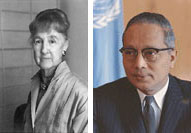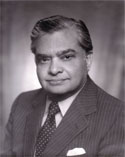History
Known as the International Peace Academy until early 2008, the International Peace Institute was founded by a group of individuals from within and outside of the United Nations who believed that a thoroughly independent institution, free from official constraints, could make a unique contribution to multilateral efforts to prevent and settle armed conflicts around the world. The vision of the founders, coupled with the hard work and dedication of IPI's four presidents, has resulted in a dynamic international research institute.
Watch our history film "40 Years of IPI"
Important moments in our institutional history include:
- Founded in 1970.
- Principal inspiration came from then UN Secretary-General U Thant (left) and Ruth Forbes Young (far left), a deeply committed philanthropist.
- Founding president Major General Indar Jit Rikhye (India) focused IPI on the training of military and civilian professionals in peacekeeping as well as selective facilitation efforts.
- The Honorable Olara Otunnu (Uganda) assumed leadership of the organization from 1990 to 1998 and expanded IPI's focus to include hands-on work with regional organizations and actors, particularly the Organization of African Unity; original policy research on the UN's rapidly evolving experience with multi-dimensional peacekeeping; expanded training activities; and more proactive outreach and education.
- Ambassador David Malone (Canada) took the helm from 1998 to 2004 and spearheaded a tremendous growth in IPI’s publications and an expansion of IPI’s policy agenda to broader dynamics of conflict and resolution, including economic agendas in civil wars, conflict prevention, sanctions, civilian protection, and statebuilding.

- Ambassador Terje Rød-Larsen (Norway) became IPI president in 2005 after more than a decade of service as a UN envoy in the Middle East. Rød-Larsen expanded IPI’s regional focus to the Middle East and Asia alongside Africa; involved IPI in intensive policy support for ongoing UN reform efforts and developed a new research and policy agenda to address transnational peace and security challenges and global response capacities beyond the UN.
- On March 24, 2008, after nearly forty years of operation, the International Peace Academy (IPA) changed its name to the International Peace Institute (IPI). The new name was chosen to better reflect the organization’s evolution from its early role as a training academy to its mature identity as a policy-driven institute for best thinking and practice across the UN’s broad peace and security agenda.
via ipinst.org



